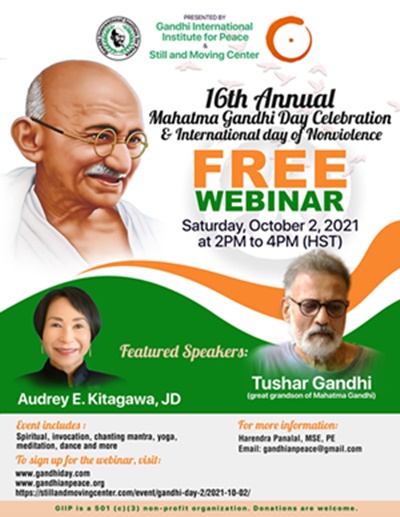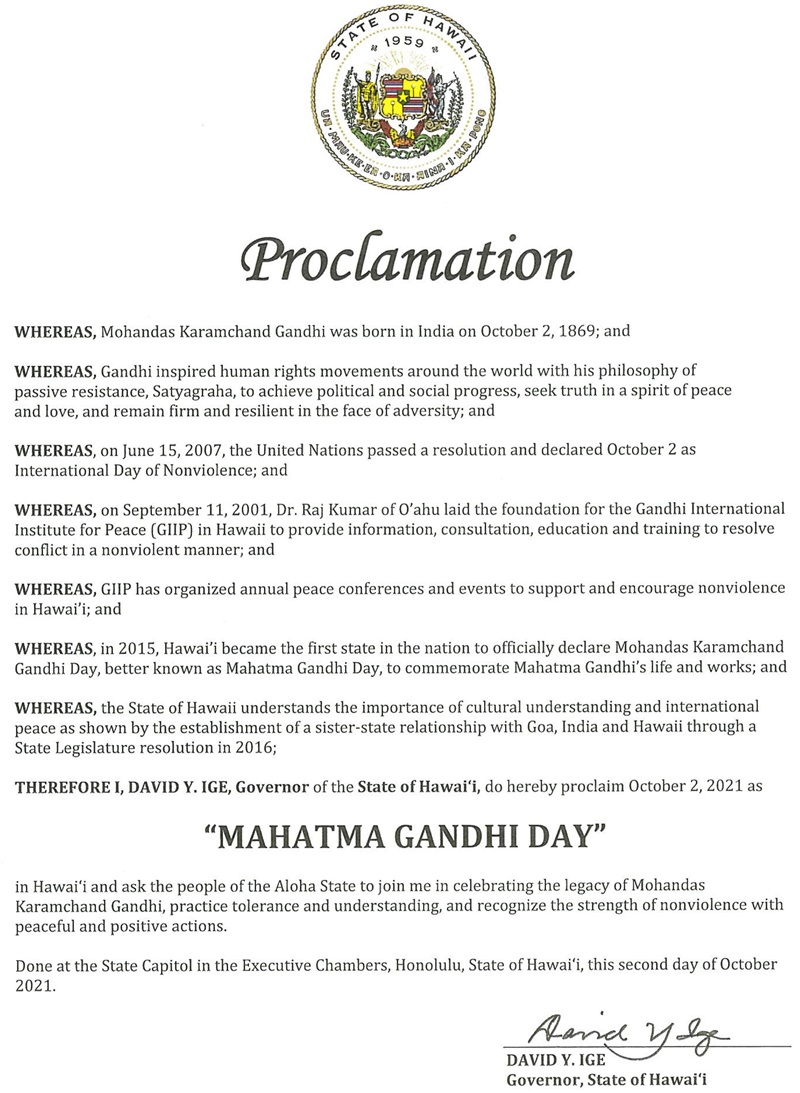 |
Mahatma Gandhi Day event in Hawaii on October 2, 2021
Los Angeles, Sep 17, 2021
NRIpress.club- Dr. Raj Kumar/Ramesh/ A.Gary Singh
The Gandhi International Institute for Peace will host a virtual program to commemorate the 152nd birthday of Mahatma Gandhi on Saturday October 2, 2021, a day designated by United Nations in his honor as the “International Day of Nonviolence” in June 2007. This program will be a free webinar which will be broadcasted from Hawaii on October 2, 2021 from 2 p.m. to 4 p.m. HST, for viewers all around the world.
 |
This webinar will feature a spiritual invocation, meditation, music and dances drawn from the local community, and from Honolulu’s Still & Moving Center, who are co-sponsors of this event. There will also be brief addresses by a variety of international and Hawaii based advocates of non-violence, including Tushar Gandhi, great grandson of Mahatma Gandhi, Audrey E. Kitagawa JD, Hon. House Representative Matthew LoPresti, Professor Marc J. Gibert, Professor Ramdas Lamb, Professor Veena Howard from California, Cliff & Renee Tillotson and Dr. Kahu Kaleo Patterson from Pacific Justice and Reconciliation Center.
Dr. Raj Kumar, Founder of Gandhi International Institute for Peace (GIIP) in Hawaii, laid the foundation of this Institute on the day when the Twin Towers were attacked by terrorists in New York on September 11, 2001. Since then, he and the members of the peace institute have been raising awareness about peace and nonviolence. On behalf of GIIP, he initiated Senate Bill SB 332 in the Hawaii Legislature in 2014 which was unanimously passed in 2015, making Hawaii the first state in the nation to officially declare October 2 as “Mahatma Gandhi Day”. |
|
|
Gandhi introduced to the world the concepts of ahimsa (nonviolence) and satyagraha (peaceful civil disobedience). These principles and his constant striving for religious harmony, social justice and eternal truth, raised the consciousness of millions of Indians. In 1947, when Gandhi went on a fast until death in Calcutta, India to stop the riots in the city between Hindus and Muslims, the killing actually stopped.
The salt march of 1930 in India is one of the best-known acts of peaceful resistance. Under the colonial rule, the British taxed the Indians for salt, and declared that making or collecting salt was illegal. Since salt is necessary for survival, this issue affected each and every Indian. They considered this law unjust and morally wrong. Gandhi organized a 241-mile march across Western India to the city of Dandi in Gujarat where he collected salt, illegally. He started the march only with only 78 people. But as the marchers proceeded thousands more joined. Weeks later, his unarmed followers marched to a government salt depot, where they met violent retaliation by the police, hence it drew worldwide sympathy.
Fortunately for humanity, Gandhi’s legacy did not die with him. Instead, his influence extended far beyond India’s borders and inspired two generations ranging from Martin Luther King Jr. in the US to Nelson Mandela in South Africa, to follow his path in their struggles for justice and freedom.
Presently, the world is going through a turmoil, and it is being threatened by coronavirus, climate change, global terrorism and war. And we see violent assaults on the women in Afghanistan. All peaceful nations need to stand together and fight together against those crimes and against those nations who harbor, train and provide a safe haven to these terrorists.
Mahatma Gandhi once said, “Nonviolence is an active force of the highest order.”


|


